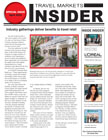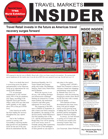One on One with ASUTIL President Enrique Urioste
New Brazilian regulations “landmark decision” for duty free border stores ASUTIL President Enrique Urioste, in a thought-provoking discussion with TMI’s Lois Pasternak, analyzes the border regulations released by Brazil on July 21.
To recap, the new rules set forth a duty free allowance of U$150 for land border sales, half of the prevailing rate of $300 (the duty for returning air passengers is currently US$500, however).
After a shocked reaction from the duty free operators on the neighboring borders, Brazil has postponed the new rates until June 30, 2015. Urioste notes that any discussion of the duty free rates must examine the history of duty free on the borders. For the past 28 years, Uruguay, for one, has been operating duty free on the border under a government decree, giving the duty free operators there a legal mandate behind their business. About 90% of their customers have been Brazilians.
At any point during this time, says Urioste, the Brazilian government, which had not created a legal entity behind duty free on the border, could have made purchasing such goods illegal. “This was always a legal-political threat,” he says.
Subsequently though, the government observed that border sales were an efficient way to develop less developed economical regions of the country and promote interest in places where it was difficult to attract settlers. Border sales also benefited travelers. “Airport travelers are entitled to buy duty free but car travelers are not. This discriminated in favor of those who could afford air travel, but against those who travel by bus or by car,” he said.
Urioste sees the new regulations as creating a system that legally recognizes duty free. “In our view it is the most important landmark decision for duty free at the border stores,” he says.
“Now the major market has created a legal and political basis for the system.
“The new regulations have established the foundations for a new era in the system. Now we must see the rules that will create the mechanisms under which the system will operate.”
Urioste believes that the negative reaction generated the day the regulations were issued was more an issue of the ‘untidiness’ of the internal political systems, than against the basic premise of the decision.
[Ed. Note: The $150 allowance figure was not mentioned until the last paragraph of the official document, the Portaria de Loja Franca Fronteira Terrestre.]
“The fact that the government suspended the new rate after only four hours is unprecedented in my memory. Now we need to hear the complexities of the allowances and how they will work within Mercosur. Currently we have a baggage allowance that was created by a Mercosur resolution in 2008.
The baggage allowance entitles a country to set a limit, or quota, on free allowances, ranging from a minimum of $150 to a maximum of $300. So Brazil is entitled to make their quota $150 under the Mercosur laws.”
Urioste notes that in ASUTIL’s conversations with Brazilian, Uruguayan and Paraguayan officials, he sees a political willingness to create a secondary quota system. “We have the baggage quota that goes from $150 to $300, plus we have the airport duty free allowance. In Uruguay this is $300 and in Brazil it is $500.
“Now the politicians will create a quota specifically for the border stores, which would be in addition









